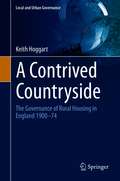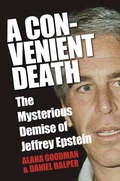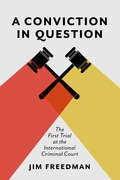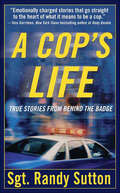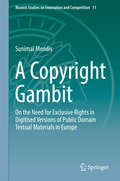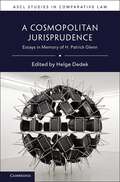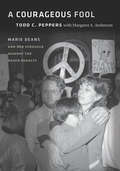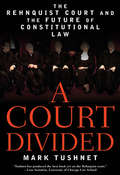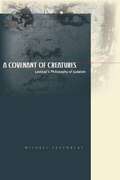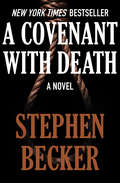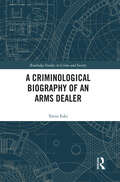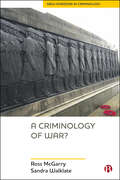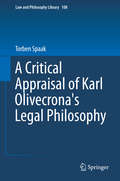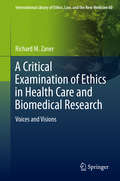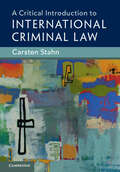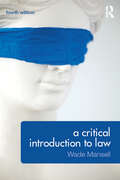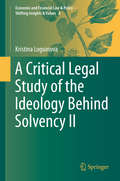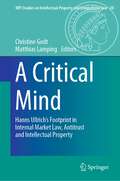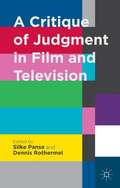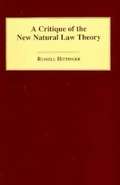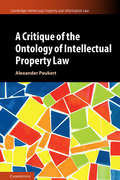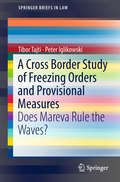- Table View
- List View
A Contrived Countryside: The Governance of Rural Housing in England 1900–74 (Local and Urban Governance)
by Keith HoggartThis book shows how governance regimes before the 1970s suppressed rural prospects of housing improvement and created conditions for middle-class capture. Using original archival sources to reveal the intricacies of local and national policy processes, weak rural housing performances are shown to owe more to national governance regimes than local under-performance. Looking `behind the scenes' at policy processes highlights neglected principles in national governance, and shows how investigating rural housing is fundamental to understanding the national scene. With original insights and a new analytical perspective, this volume offers evidence and conclusions that challenge mainstream assumptions in public policy, housing, rural studies and planning.
A Convenient Death: The Mysterious Demise of Jeffrey Epstein
by Daniel Halper Alana GoodmanA must-read for fans of the Netflix docuseries Filthy Rich: The full investigation of the shocking death of billionaire Jeffrey Epstein and those powerful enough to have orchestrated it. In A Convenient Death, investigative reporters Alana Goodman and Daniel Halper search for the truth of what really happened to Jeffrey Epstein. With access to Epstein's victims and lawyers, to doctors, Wall Street insiders and law enforcement officers, they reveal the dirty secrets and sinister ties that may have driven someone in Epstein&’s circle to take matters into their own hands. On the morning of August 10, 2019, Epstein, friend and financier to the rich and powerful, was found unresponsive in his prison cell in lower Manhattan, where he awaited his second trial for sexual predation and other crimes. He was rushed to a local hospital and one hour later pronounced dead by suicide. Across the world, a sinister web of powerful billionaires, celebrities, and politicians, including Bill and Hillary Clinton, had reason to sigh with relief at news of Epstein&’s death. Having flown on his private planes and visited his many homes—the sites of so many illicit activities—they had much to lose if their transgressions were ever exposed. And now, Epstein was silenced for good. But cracks in the official story soon emerged. And the questions kept coming: · Why did the surveillance cameras in front of Epstein&’s cell stop working that night? · Why was Epstein's cellmate transferred out and never replaced? · Why was a high-profile prisoner so suddenly taken off suicide watch and left unguarded for eight hours? Was Epstein murdered to protect the powerful people who feared what he might reveal? The American public deserves to know the truth. With this book, they can finally understand the facts and decide for themselves.
A Conviction in Question: The First Trial at the International Criminal Court
by Jim FreedmanA lively narrative account of the first case to appear at the International Criminal Court, A Conviction in Question documents the trial of Union of Congolese Patriots leader and warlord, Thomas Lubanga Dyilo. Although Dyilo’s crimes, including murder, rape, and the forcible conscription of child soldiers, were indisputable, legal wrangling and a clash of personalities caused the trial to be prolonged for an unprecedented six years. This book offers an accessible account of the rapid evolution of international law and the controversial trial at the foundation of the International Criminal Court. The first book to thoroughly examine Dyilo’s trial, A Conviction in Question looks at the legal issues behind each of the trial’s critical moments, including the participation of Dyilo’s victims at the trial and the impact of witness protection. Through eye-witness observation and analysis, Jim Freedman shows that the trial suffered from all the problems associated with ordinary criminal law trials, and uses Dyilo’s case to further comment on the role of international courts in a contemporary global context.
A Cop's Life: True Stories from Behind the Badge
by Randy SuttonAfter September 11, 2001 Las Vegas Police Sergeant Randy Sutton began soliciting writing from law enforcement officers-his goal being to bridge the gap between the police and those they serve, with a book that offers a broad and thoughtful look at the many facets of police life. Hundreds of active and former officers responded from all over the United States: men and women from big cities and small towns, some who had written professionally, but most for the first time. Sutton culled the selections into five categories: The Beat, Line of Duty, War Stories, Officer Down, and Ground Zero. The result is True Blue, a collection of funny, charming, exciting, haunting stories about murder investigations, missing children, bungling burglars, car chases, lonely and desperate shut-ins, routine traffic stops, officers killed in the line of duty, and the life-changing events of September 11. Here, officers reveal their emotions-fear and pride, joy and disgust, shame and love-as they recount the defining moments of their careers. In these stories, the heart and soul behind the badge shines through in unexpected ways. True Blue will change the way we think about the deeply human realm of police service.
A Copyright Gambit: On the Need for Exclusive Rights in Digitised Versions of Public Domain Textual Materials in Europe (Munich Studies on Innovation and Competition #11)
by Sunimal MendisEuropean memory institutions are repositories of a wealth of rare documents that record public domain content. These documents are often stored in ‘dark-archives’ to which members of the public are granted limited access, resulting in the public domain content recorded therein being relegated to a form of ‘forgotten-knowledge’. Digitisation offers a means by which such public domain content can be made speedily and easily accessible to users around the world. For this reason, it has been hailed as the harbinger of a new ‘digital renaissance’. This book examines the topical issue of the need to preserve exclusivity over digitised versions of rare documents recording public domain content. Based on data gathered through an empirical survey of digitisation projects undertaken by fourteen memory institutions in five European Union Member States, it argues for the introduction of exclusive rights in digitised versions of rare documents recording public domain textual content as a means of incentivising private-sector investment in the digitisation process. It concludes by presenting a detailed proposal for a European Union Regulation that would grant memory institutions a limited-term related right in digitised versions of rare documents held in their collections subject to stringent exceptions and limitations that are designed to safeguard user interests.
A Cosmopolitan Jurisprudence: Essays in Memory of H. Patrick Glenn (ASCL Studies in Comparative Law)
by Helge DedekH. Patrick Glenn (1940–2014), Professor of Law and former Director of the Institute of Comparative Law at McGill University, was a key figure in the global discourse on comparative law. This collection is intended to honor Professor Glenn's intellectual legacy by engaging critically with his ideas, especially focusing on his visions of a 'cosmopolitan state' and of law conceptualized as 'tradition'. The book explores the intellectual history of comparative law as a discipline, its attempts to push the objects of its study beyond the positive law of the nation-state, and both its potential and the challenges it must confront in the face of the complex phenomena of globalization and the internationalization of law. An international group of leading scholars in comparative law, legal philosophy, legal sociology, and legal history takes stock of the field of comparative law and where it is headed.
A Courageous Fool: Marie Deans and Her Struggle against the Death Penalty
by Todd C. Peppers Margaret A. Anderson Joseph M. GiarratanoThere have been many heroes and victims in the battle to abolish the death penalty, and Marie Deans fits into both of those categories. A South Carolina native who yearned to be a fiction writer, Marie was thrust by a combination of circumstances—including the murder of her beloved mother-in-law—into a world much stranger than fiction, a world in which minorities and the poor were selected to be sacrificed to what Supreme Court Justice Harry Blackmun called the "machinery of death."Marie found herself fighting to bring justice to the legal process and to bring humanity not only to prisoners on death row but to the guards and wardens as well. During Marie's time as a death penalty opponent in South Carolina and Virginia, she experienced the highs of helping exonerate the innocent and the lows of standing death watch in the death house with thirty-four condemned men.
A Courageous Fool: Marie Deans and Her Struggle against the Death Penalty
by Todd C. Peppers Margaret A. AndersonThere have been many heroes and victims in the battle to abolish the death penalty, and Marie Deans fits into both of those categories. A South Carolina native who yearned to be a fiction writer, Marie was thrust by a combination of circumstances--including the murder of her beloved mother-in-law--into a world much stranger than fiction, a world in which minorities and the poor were selected to be sacrificed to what Supreme Court Justice Harry Blackmun called the "machinery of death." Marie found herself fighting to bring justice to the legal process and to bring humanity not only to prisoners on death row but to the guards and wardens as well. During Marie's time as a death penalty opponent in South Carolina and Virginia, she experienced the highs of helping exonerate the innocent and the lows of standing death watch in the death house with thirty-four condemned men.
A Court Divided: The Rehnquist Court and the Future of Constitutional Law
by Mark Tushnet"An incisive consideration of the Supremes, offering erudite yet accessible clues to legal thinking on the most important level."--Kirkus Reviews In this authoritative reckoning with the eighteen-year record of the Rehnquist Court, Georgetown law professor Mark Tushnet reveals how the decisions of nine deeply divided justices have left the future of the Court; and the nation; hanging in the balance. Many have assumed that the chasm on the Court has been between its liberals and its conservatives. In reality, the division was between those in tune with the modern post-Reagan Republican Party and those who, though considered to be in the Court's center, represent an older Republican tradition. As a result, the Court has modestly promoted the agenda of today's economic conservatives, but has regularly defeated the agenda of social issues conservatives; while paving the way for more radically conservative path in the future.
A Court of Refuge: Stories from the Bench of America's First Mental Health Court
by Ginger Lerner-Wren Rebecca A. EcklandThe story of America's first Mental Health Court as told by its presiding judge, Judge Ginger Lerner-Wren--from its inception in 1997 to its implementation in over 400 courts across the nationAs a young legal advocate, Ginger Lerner-Wren bore witness to the consequences of an underdeveloped mental health care infrastructure. Unable to do more than offer guidance, she watched families being torn apart as client after client was ensnared in the criminal system for crimes committed as a result of addiction, homelessness, and mental illness. She soon learned this was a far-reaching crisis--estimates show that in forty-four states, jails and prisons house ten times more people with serious mental illnesses than state psychiatric hospitals. In A Court of Refuge, Judge Ginger Lerner-Wren tells the story of how the first dedicated mental health court in the United States grew from an offshoot of her criminal division, held during lunch hour without the aid of any federal funding, to a revolutionary institution. Of the two hundred thousand people behind bars at the court's inception in 1997, more than one in ten were known to have schizophrenia, bipolar disorder, or major depression. To date, the court has successfully diverted more than twenty thousand people suffering from various psychiatric conditions from jail and into treatment facilities and other community resources. Working under the theoretical framework of therapeutic jurisprudence, Judge Lerner-Wren and her growing network of fierce, determined advocates, families, and supporters sparked a national movement to conceptualize courts as a place of healing. Today, there are hundreds of such courts in the US.Poignant and compassionately written, A Court of Refuge demonstrates both the potential relief mental health courts can provide to underserved communities and their limitations in a system in dire need of vast overhauls of the policies that got us here. Lerner-Wren presents a refreshing possibility for a future in which criminal justice and mental health care can work in tandem to address this vexing human rights issue--and to change our attitudes about mental illness as a whole.
A Covenant of Creatures: Levinas's Philosophy of Judaism
by Michael Fagenblat"I am not a particularly Jewish thinker," said Emmanuel Levinas, "I am just a thinker." This book argues against the idea, affirmed by Levinas himself, that Totality and Infinity and Otherwise Than Being separate philosophy from Judaism. By reading Levinas's philosophical works through the prism of Judaic texts and ideas, Michael Fagenblat argues that what Levinas called "ethics" is as much a hermeneutical product wrought from the Judaic heritage as a series of phenomenological observations. Decoding the Levinas's philosophy of Judaism within a Heideggerian and Pauline framework, Fagenblat uses biblical, rabbinic, and Maimonidean texts to provide sustained interpretations of the philosopher's work. Ultimately he calls for a reconsideration of the relation between tradition and philosophy, and of the meaning of faith after the death of epistemology.
A Covenant with Death: A Novel
by Stephen BeckerA stunning courtroom drama set in 1920s New Mexico: &“If you enjoyed Anatomy of a Murder or To Kill a Mockingbird, this is your kind of book&” (The Philadelphia Inquirer). On a sultry day in the spring of 1923, Louise Talbot spends the last afternoon of her life lounging in the shade of a sycamore tree in her front yard. Beautiful and vivacious, Louise is the talk of Soledad City—every man lusts after her; every woman wants to know her secrets. She is found strangled to death that evening, and when the investigation uncovers her affair with another man, the citizens of the frontier town draw the obvious conclusion: Bryan Talbot murdered his wife in a fit of jealousy and rage. Presiding over the trial is twenty-nine-year-old Ben Lewis. Appointed to the bench as a tribute to the memory of his late father, he fears he is too inexperienced to sentence another man to death. All the evidence points to Talbot, however, and it is a magistrate&’s sworn duty to see that justice is served. But when a last-second twist casts the question of the defendant&’s guilt or innocence in a shocking new light, Judge Lewis must decide whether to uphold the law—or let a murderer go free. A thrilling suspense story and a fascinating inquiry into human nature and the true meaning of justice, A Covenant with Death was a New York Times bestseller and the basis for a feature film starring George Maharis and Gene Hackman.
A Criminological Biography of an Arms Dealer (Routledge Studies in Crime and Society)
by Yarin EskiFor many, the arms trade and its dealers are the root cause of regional wars and global terrorism. In both public and academic debates, arms dealers are considered immoral as they profit from conflict, due to their key position in the international arms trading business. Nevertheless, there seems to be little to no interest in the personal lives of those actively involved. In his criminological biography of a licensed arms dealer, Yarin Eski provides an in-depth, interdisciplinary approach to and understanding of the global arms trade, revealing a deep insider view placed in a wider sociocultural context. From early discussions about childhood and career choices, to reflections on becoming and being an arms trader, Eski offers a methodologically embedded approach and advances biographical writing in the field of Criminology. It is a unique and thought-provoking contribution to the fields of criminology, ethnography, sociology, critical security studies, policing studies, war studies and international politics and offers an unparalleled insight from within.
A Criminology of War? (New Horizons in Criminology)
by Sandra Walklate Ross McGarryIn recent years, the academic study of ‘war’ has gained renewed popularity in criminology. This book illustrates its long-standing engagement with this social phenomenon within the discipline. Foregrounding established criminological work addressing war and connecting it to a wide range of extant sociological literature, the authors present and further develop theoretical and conceptual ways of thinking critically about war. Providing a critique of mainstream criminology, the authors question whether a ‘criminology of war’ is possible, and if so, how this seemingly ‘new horizon’ of the discipline might be usefully informed by sociology.
A Critical Appraisal of Karl Olivecrona's Legal Philosophy (Law and Philosophy Library #108)
by Torben SpaakThis book offers a critical appraisal of Karl Olivecrona's legal philosophy. Based on Olivecrona's critique of the view that law has binding force, the analysis of the concept and function of a legal rule, and the idea that law is a matter of organized force, the book argues that Olivecrona's legal philosophy is a unique contribution to twentieth century legal philosophy. It shows how Olivecrona's philosophy can be used in the assessment of contemporary theories of law, such as those put forward by Hart, Raz, Dworkin, and Alexy. In addition, the book argues that Olivecrona's various discussions of theories defended by key people in the history of legal and political philosophy are highly interesting contributions. They not only increase our understanding of the legal and political philosophy of previous generations, but also enhances our insight into legal-philosophical questions that remain with us today.
A Critical Examination of Ethics in Health Care and Biomedical Research: Voices and Visions (International Library of Ethics, Law, and the New Medicine #60)
by Richard M. ZanerThis book is a critical examination of certain basic issues and themes crucial to understanding how ethics currently interfaces with health care and biomedical research. Beginning with an overview of the field, it proceeds through a delineation of such key notions as trust and uncertainty, dialogue involving talk and listening, the vulnerability of the patient against the asymmetric power of the health professional, along with professional and individual responsibility. It emphasizes several themes fundamental to ethics and health care: (1) the work of ethics requires strict focus on the specific situational understanding of each involved person. (2) Moral issues, at least those intrinsic to each clinical encounter, are presented solely within the contexts of their actual occurrence; therefore, ethics must not only be practical but empirical in its approach. (3) Each particular situation is in its own way imprecise and uncertain and the different types and dimensions of imprecision and uncertainty are critical for everyone involved. (4) Finally, medicine and health care more broadly are governed by the effort to make sense of the healer's experiences with the patient, whose own experiences and interpretations are ingredient to what the healer seeks to understand and eventually treat. In addition to providing a way to develop ethical considerations in clinical life and research projects, the book proposes that narratives provide the finest way to state and grapple with these themes and issues, whether in classrooms or real-life situations. It concludes with a prospective analysis of newly emerging issues presented by and within the new genetics, which, together within a focus on the phenomenon of birth, leads to an clearer understanding of human life.
A Critical Introduction to International Criminal Law
by Carsten StahnInternational criminal law has witnessed a rapid rise after the end of the Cold War. The UN refers to the birth of a new 'age of accountability', but certain historical objections, such as selectivity or victor's justice, have never fully gone away, and many of the justice dimensions of international criminal law remain unexplored. Various critiques have emerged in socio-legal scholarship or globalization discourse, revealing that there is a stark discrepancy between reality and expectation. Linking discussion of legal theories, case-law and practice to scholarship and opinion, A Critical Introduction to International Criminal Law explores these critiques through five main themes at the heart of contemporary dilemmas: • The shifting contours of criminality and international crimes • The tension between individual and collective responsibility • The challenges of domestic, international, hybrid and regional justice institutions • The foundations of justice procedures • Approaches towards punishment and reparation Suitable for students, academics and professionals from multiple fields wishing to understand contemporary theories, practices and critiques of international criminal law. This title is also available as Open Access on Cambridge Core.
A Critical Introduction to Law
by Wade Mansell Belinda Meteyard Alan ThomsonChallenging the usual introductions to the study of law, A Critical Introduction to Law argues that law is inherently political and reflects the interests of the few even while presenting itself as neutral. This fully revised and updated fourth edition provides contemporary examples to demonstrate the relevance of these arguments in the twenty-first century. The book includes an analysis of the common sense of law; the use of anthropological examples to gain external perspectives of our use and understanding of law; a consideration of central legal concepts, such as order, rules, property, dispute resolution, legitimation and the rule of law; an examination of the role of law in women's subordination and finally a critique of the effect of our understanding of law upon the wider world. Clearly written and admirably suited to provoking discussions on the role of law in our contemporary world, this book is ideal for undergraduate and postgraduate students reading law, and will be of interest to those studying legal systems and skills courses, jurisprudence courses, and law and society.
A Critical Legal Study of the Ideology Behind Solvency II (Economic and Financial Law & Policy – Shifting Insights & Values #4)
by Kristina LoguinovaThis book analyzes the impact of Solvency II. In recent years, EU legislators have sought to introduce fundamental reforms. Whether these reforms were indeed fundamental is critically investigated with regard to a post-crisis piece of financial legislation affecting the EU’s largest institutional investors: Solvency II. Namely, the last financial and economic crisis, the worst financial catastrophe of the last decade, revealed that financial law in particular was not sufficiently mature to maintain the existence of a robust and trust-worthy financial system that could protect society from economic decline. The work also makes concrete recommendations on achieving a more sustainable future. As such, it offers a valuable resource for anyone who is interested in the financial system, the EU political economy, insurance, sustainability, and Critical Legal Studies.
A Critical Mind: Hanns Ullrich’s Footprint in Internal Market Law, Antitrust and Intellectual Property (MPI Studies on Intellectual Property and Competition Law #30)
by Matthias Lamping Christine GodtThis book traces the academic footprint of Hanns Ullrich. Thirty contributions revolve around five central topics of his oeuvre: the European legal order, competition law, intellectual property, the regulation of new technologies, and the global market order. Acknowledging him as a trailblazer, the book aims to capture how deeply Hanns Ullrich has influenced contemporaries and subsequent generations of scholars. The contributors re-iterate the path-breaking patterns of his teachings, such as his contemplation of intellectual property as embedded in competition, the necessity of balancing private and public interests in intellectual property law, the policies of market integration, and the peculiar relationship of technological advancement and protectionism.
A Critique of Judgment in Film and Television
by Silke Panse Dennis RothermelA Critique of Judgment in Film and Television is a response to a significant increase of judgment and judgmentalism in contemporary television, film, and social media by investigating the changing relations between the aesthetics and ethics of judgment.
A Critique of the New Natural Law Theory (Revisions: Vol 7)
by Russell HittingerIn this book, Hittinger seeks to provide a critique of the "new natural law theory" developed over the past two decades by Germain G. Grisez and, to a lesser degree, by John M. Finnis. Grisez's articulation of the position began in the early 1960s with the publication of his Contraception and the Natural Law, continued with the publication of major articles and massive books concerned with abortion, euthanasia and other issues, and , while still developing today, culminated in the 1983 publication of his Christian Moral PrinCiples. the first of a projected four-volume work in moral theology. In Christian Moral Principles.
A Critique of the Ontology of Intellectual Property Law (Cambridge Intellectual Property and Information Law #57)
by Alexander PeukertIntellectual property (IP) law operates with the ontological assumption that immaterial goods such as works, inventions, and designs exist, and that these abstract types can be owned like a piece of land. Alexander Peukert provides a comprehensive critique of this paradigm, showing that the abstract IP object is a speech-based construct, which first crystalised in the eighteenth century. He highlights the theoretical flaws of metaphysical object ontology and introduces John Searle's social ontology as a more plausible approach to the subject matter of IP. On this basis, he proposes an IP theory under which IP rights provide their holders with an exclusive privilege to use reproducible 'Master Artefacts.' Such a legal-realist IP theory, Peukert argues, is both descriptively and prescriptively superior to the prevailing paradigm of the abstract IP object. This work was originally published in German and was translated by Gill Mertens.
A Cross Border Study of Freezing Orders and Provisional Measures: Does Mareva Rule the Waves? (SpringerBriefs in Law)
by Tibor Tajti Peter IglikowskiThis book compares the law on provisional measures of common law and civil law countries, the goal being to identify and compare their main advantages and disadvantages. The guiding concept is a well-known statement by the Justices of the US Supreme Court expressed in the famous Grupo Mexicano case, according to which the “age of slow-moving capital and comparatively immobile wealth” has now passed, and the 21st century requires a fresh look at the law of provisional measures. In the quest to find a model for interim relief, the Mareva Injunction, subsequently renamed the ‘Freezing Order’ in the English Civil Procedural Rules, is used as the benchmark to which each of the targeted systems discussed here is compared. This is because international scholarship, as well as e.g. the US Supreme Court, generally consider the Mareva Injunction to be the most effective and farthest-reaching provisional remedy. The analysis suggests that the Mareva Injunction / Freezing Order represents the type of relief that will most likely continue to dominate as the most efficient and farthest-reaching interim measure in the years to come.
A Cross-Border-Only Regulation for Consumer Transactions in the EU: A Fresh Approach to EU Consumer Law (SpringerBriefs in Business)
by Christian Twigg-FlesnerFor almost three decades, the European Union (EU) has adopted measures to regulate consumer transactions within the internal market created by the EU Treaties. Existing legislation is largely based on directives harmonizing aspects of national consumer laws. This Brief argues that a more appropriate approach for EU consumer law would be legislation in the form of a regulation which is applicable to cross-border transactions only. The author considers the constitutional constraints of the EU Treaties, before examining the case for a cross-border-only measure. He argues that the cross-border approach is preferable, because it would provide clearer benefits for consumers seeking to buy goods and services across borders, while not upsetting domestic law unnecessarily--in particular in the context of e-commerce, with implications for industry, policymaking, and regional development. The Brief concludes by suggesting that a successful EU measure on cross-border consumer transactions could create a template for global initiatives for transnational consumer law.
